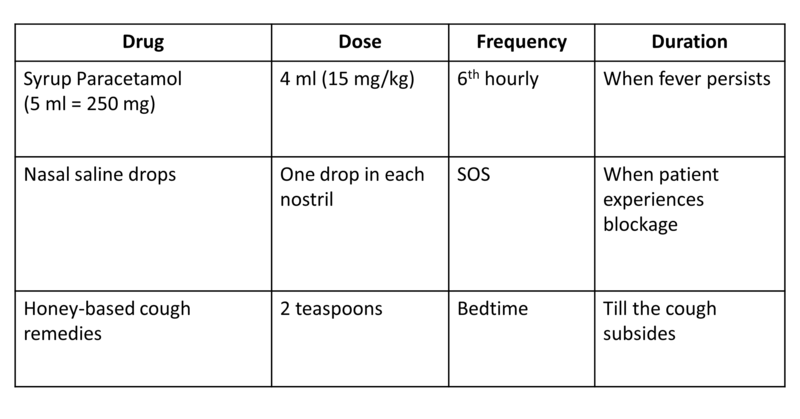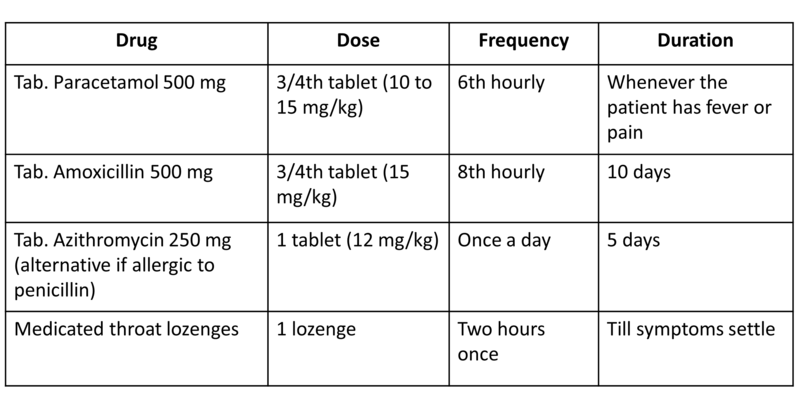Is it viral or bacterial? Evidence-based disease management & case discussions by Dr. Balaji Chinnaswami
M3 India Newsdesk Aug 22, 2019
Dr. Balaji Chinnaswami provides quick evidence-based diagnosis and prescription guide for distinguishing between viral and bacterial infections, also explaining with the help cases the science that goes behind treatment of and red flags one needs to watch out for.

Upper Respiratory Tract Infection (URTI)
A 3-year old boy weighing 14 kg presents with fever, cough, and cold for two days. The father reported that he had recently had cough and cold. Tonsils seemed congested but no pus points and no tender cervical nodes were observed.
Science behind management
- Presence of cough and coryza, history of similar illness in the family, tonsils just congested with no pus points or exudates, and the age of the child (less than 5 years) suggests viral upper respiratory tract infection (URTI).
- Absence of fast breathing means the pathology is upper respiratory.
- No antibiotics are needed. Symptomatic treatment is enough.
- Use of nonspecific over the counter (OTC) cough suppressants is discouraged. Studies show that honey-based products are as effective as Dextromethorphan for cough.
Rx
 Advice to give to parents
Advice to give to parents
- Ensure the child gets adequate rest and oral fluids
- Provide salt water gargling for older children with sore throat
- Report to casualty immediately if the child's breathing is fast or food intake is poor
- Review after 48 hours if fever doesn’t subside
Streptococcal Pharyngitis
An 8-year old girl weighing 25 kg presents with high fever and comes to the OPD with complaints of severe sore throat and difficulty in swallowing food. On throat examination there is a yellowish discharge over inflamed tonsils. The upper cervical nodes are tender to palpate.
Science behind management
- Bacteria tends to localise in the throat with symptoms of dysphagia, tonsillar exudates, and tender cervical lymphadenitis. There will be no cough or coryza.
- Group A beta haemolytic Streptococci usually affect school-going children (>5 years).
- Antibiotics are the treatment of choice. A 10-day course of Amoxicillin or Azithromycin should be prescribed is patient is allergic to penicillin.
Investigations to run
Throat swab for culture and sensitivity or Rapid Antigen Test is advisable if feasible.
Rx
 Advice to give to parents
Advice to give to parents
- Continue antibiotics for 10 days to prevent complications like rheumatic fever.
- Ensure the child gets adequate rest and hydration. If the child has difficulty swallowing solids, try liquid diet like milk, juices, porridge
- Review after 48 hours if symptoms don’t improve
Key takeaways
- Young children with running nose, cough and no exudates in the throat are probably having viral URTI and do not need antibiotics.
- Older children without running nose, erythema and exudates in throat and tender cervical nodes are probably suffering from bacterial infections.
- Amoxicillin (15 mg/kg three times ) for 10 days is the preferred antibiotic for streptococcal pharyngitis.
Redflags that warrant immediate action
- Fast breathing (40 breaths/min for <5 years & 30 breaths/min for >5 years) suggest lower respiratory tract infection. This needs further evaluation.
- Dirty white patch extending beyond tonsils and covering soft palate, pharynx, uvula with bleeding on scrapping could be diptheria which needs tertiary care.
Implications in practice
Many general practitioners have a tendency to add antibiotics to all their patients with fever and upper respiratory symptoms. This evidence based management helps in differentiating bacterial and viral upper respiratory infections, thus avoiding prescription of unnecessary antibiotics to all children. Our small effort will reduce emergence of antibiotic resistance in a big way.
Disclaimer- The views and opinions expressed in this article are those of the author's and do not necessarily reflect the official policy or position of M3 India.
The author, Dr. Balaji Chinnaswami is a professor of Paediatrics at a reputed medical college in Chennai.
-
Exclusive Write-ups & Webinars by KOLs
-
Daily Quiz by specialty
-
Paid Market Research Surveys
-
Case discussions, News & Journals' summaries
 Advice to give to parents
Advice to give to parents Advice to give to parents
Advice to give to parents